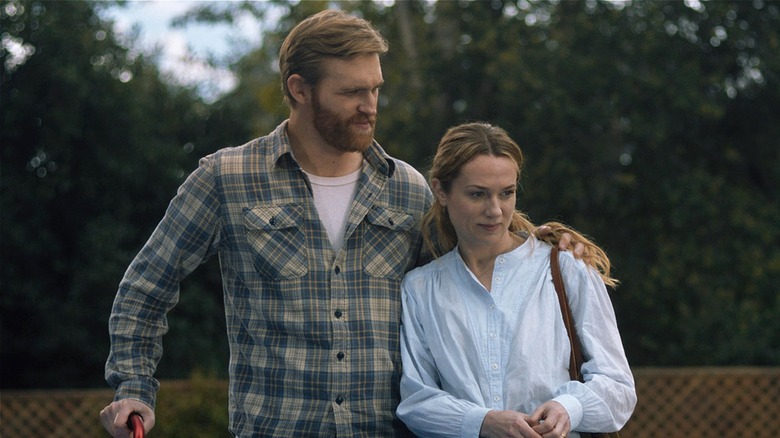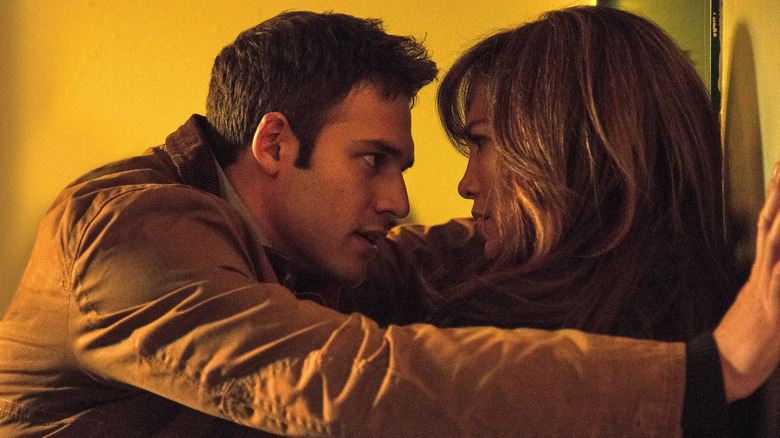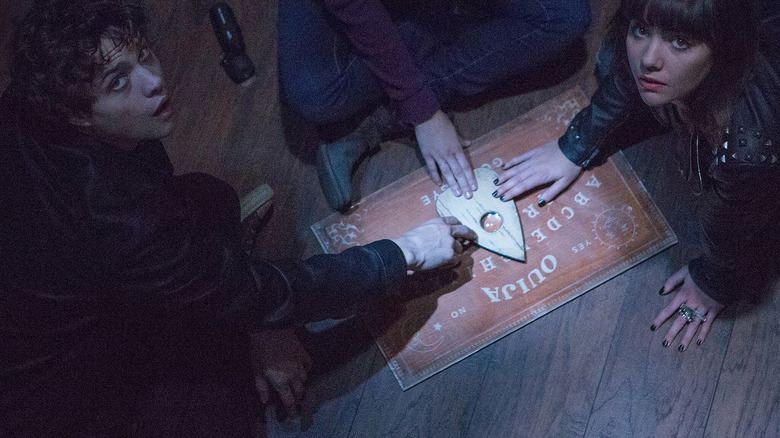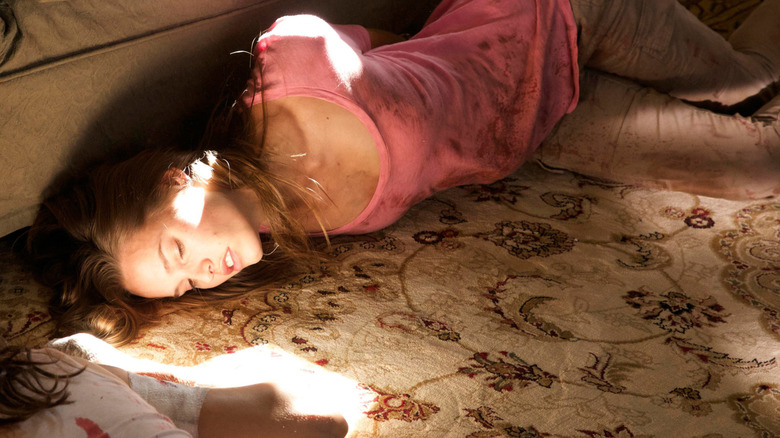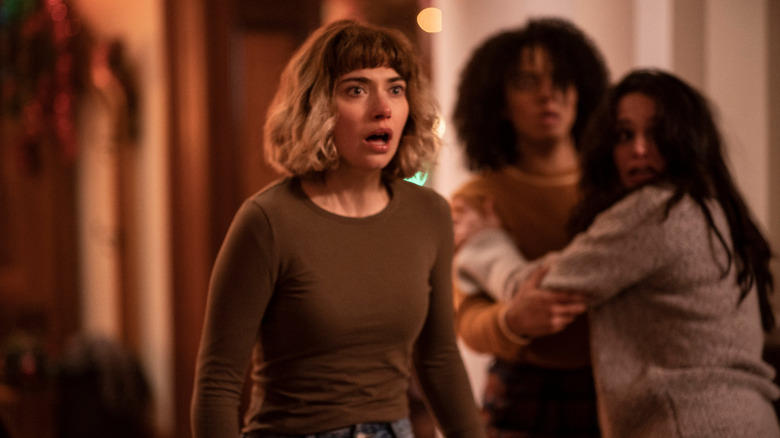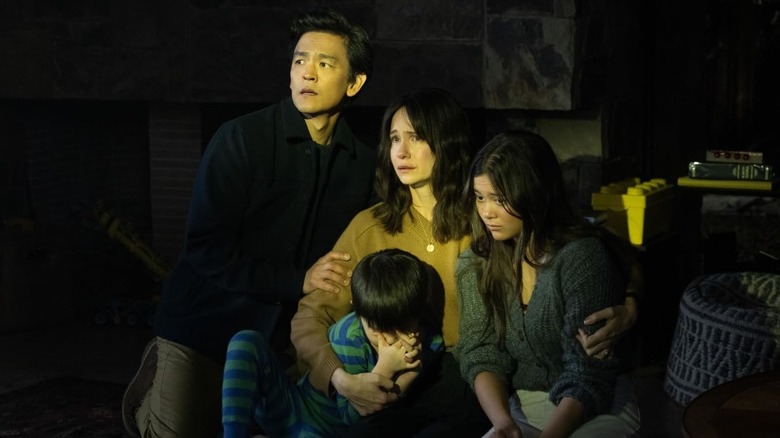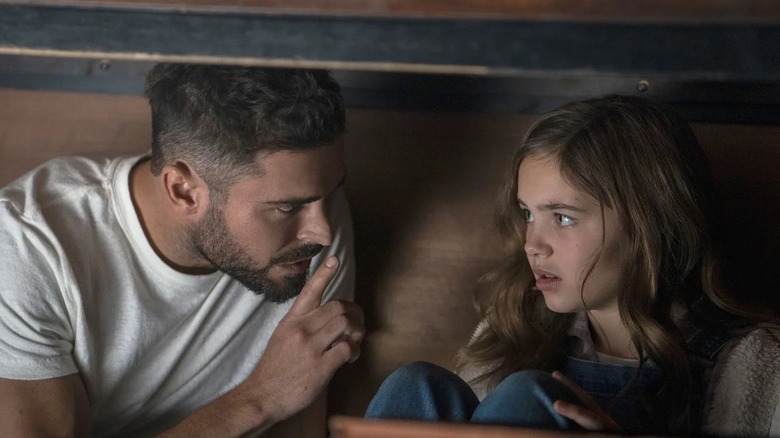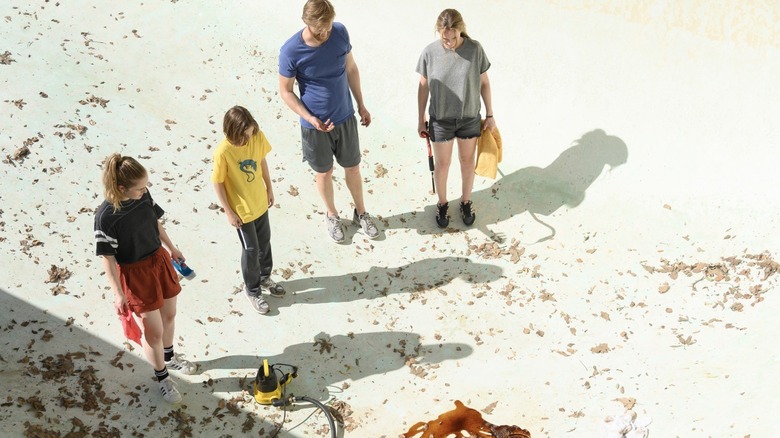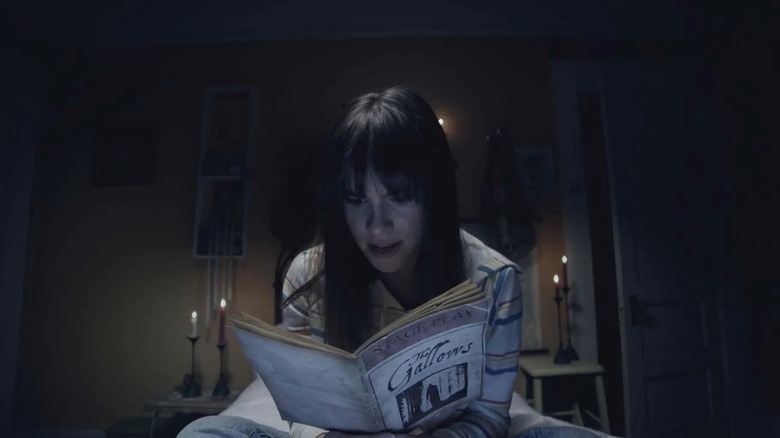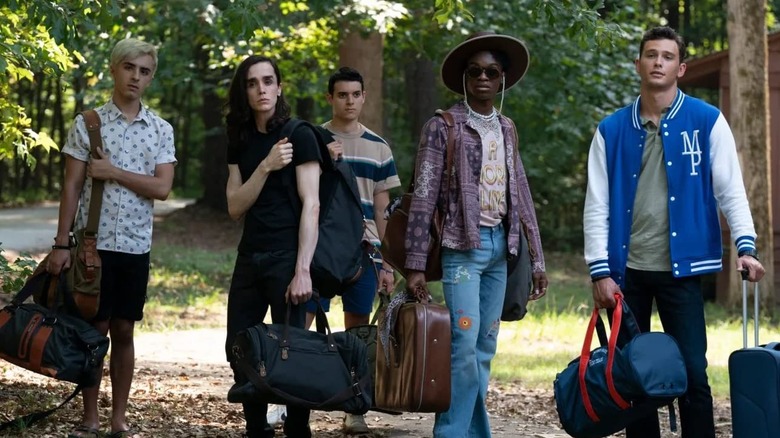10 Worst Blumhouse Movies Ranked
When things go right with movies financed and spearheaded by Blumhouse Productions, they go oh-so-right. Titles like "Get Out" and "Whiplash" (among others) are shining examples of what happens when Blumhouse's low-budget filmmaking model allows creative filmmakers to pursue original, thoughtful ideas. Such projects wouldn't have been possible at other studios, but Blumhouse's famously cost-effective approach ensured they'd see the light of day. Other cheap mainstream hits like "The Black Phone" and "The Purge" saw Blumhouse demonstrating that it's possible to deliver a major box office blockbuster without breaking the bank.
Of course, not every motion picture affixed with the Blumhouse Productions logo is a revered masterpiece. As a byproduct of both how many movies Blumhouse has released and the filmmakers that the label has worked with, there have been several absolutely awful films released from this studio. The most glaringly obvious examples of such motion pictures are the 10 lowest-rated Blumhouse titles on Letterboxd. Those features (ranked below from "least worst" to the absolute worst) are now infamous works that failed to deliver the bare minimum thrills and chills people expect from horror films. So weak is the filmmaking on these projects that Letterboxd users haven't even been able to uncover ironic enjoyment in their shortcomings.
Instead, these 10 movies are more infamous for being absolute torture to sit through. For those wondering what the absolute bottom of the Blumhouse Productions barrel looks like, behold these despised genre titles.
10. The Boy Next Door
There's an art to doing sleazy erotic thrillers like "The Boy Next Door." To execute them for maximum fun and steaminess, you need a deft hand in the director's chair. Unfortunately, "The Boy Next Door" was helmed by "The Fast and the Furious" and "xXx" helmer Rob Cohen, a man known for generic action shlock, not effective sensuality. Unsurprisingly, his work on "The Boy Next Door," a movie following middle-aged woman Claire Peterson (Jennifer Lopez) carrying on a dangerous affair with her younger neighbor Noah (Ryan Guzman), resulted in a widely-criticized title.
For starters, most folks have lambasted "The Boy Next Door" for being pretty boring. Even at 91 minutes, this feature's pacing is all wrong and it's rarely fun to watch. Various reviewers were also bamboozled by the dearth of sex scenes and steaminess during its runtime. What's the point of making an erotic thriller if you're going to skimp on both eroticism and thrills? It's like making a "John Wick" movie devoid of punching. The terrible performances and predictable jump scares were two other "The Boy Next Door" elements that scored disastrous marks.
Only an infamously bizarre scene involving a first edition copy of "The Iliad" has garnered any kind of positive feedback from the general public. Save for that sequence, though, Blumhouse's monotonous "The Boy Next Door" has become a go-to model for how not to make an erotic thriller.
9. Ouija
"The LEGO Movie" and "Barbie" are proof positive that movies based on toys aren't doomed to become plastic garbage. However, the slew of counterexamples certainly makes it seem impossible to deliver quality cinema based on playthings. Projects like "The Playmobil Movie," "Battleship," and especially 2014's "Ouija" have given this subgenre a bad name. This Stiles White directorial effort saw a bunch of young people, including Laine Morris (Olivia Cooke), unleashing dark forces when they get wrapped up in an Ouija board. Tons of derivative jump scares ensue, none of which were enough to give this project a positive reputation.
The most noticeable recurring complaint about "Ouija" is how dull it turns out to be. Horror movies can procure fanbases in spite of many flaws, but tedium is one element that tends to alienate everyone. The grim, darkly-lit visuals combined with the forgettable jump scares, not to mention a plethora of emotionally inert characters, result in a movie that left moviegoers yawning rather than recoiling in their seats. Over a decade after its release, the only entertainment certain Letterboxd users have wrung out of watching this title is witnessing Olivia Cooke (years before she anchored "House of the Dragon and "Thoroughbreds") working well beneath her pay grade.
Even the spectacle of seeing a future superstar slum it out in a dreadful Blumhouse horror movie, though, hasn't done anything to elevate "Ouija's" reputation. This is just a crummy horror title and the toy movie adaptation's creative nadir.
8. Martyrs
Chances are, if you're reading this, you've never heard of the Kevin and Michael Goetz directorial effort "Martyrs." Quietly dropped onto the small screen in January 2016, the project (produced by then-future DC Studios head Peter Safran) was a revenge thriller about Lucie Jurin (Troian Bellisario) and lifelong pal Anna Assaoui (Bailey Noble) still reeling from unspeakable childhood abuse. As adults, they set out to get gnarly payback on those who hurt them. Naturally, a darker, more harrowing mystery lies in store for the duo as they search for the truth.
This remake of a 2008 French movie received universally negative critical reviews that mirrored its terrible Letterboxd reputation. A sentiment common across the most scathing takedowns of "Martyrs" was how it took an initially challenging piece of non-American cinema and transformed it into a generic English-language horror film. All that potential from its source material flushed down the drain. The straightwashing of a key "Martyrs" character was also commonly criticized when comparing it to its predecessor. Even for those who hadn't seen the original "Martyrs," though, this remake was absolutely abysmal. Everything about this production has come under severe criticism, particularly its acting and commitment to executing its central premise with no personality.
In hindsight, one has to wonder who on Earth "Martyrs" was for. The original isn't famous enough to have massive name recognition with the general public. Arthouse cinema fiends aware of it didn't want a remake. It was truly a horror film for nobody.
7. Black Christmas
Why is it PG-13? This is the most common refrain echoing throughout the Letterboxd reviews for director Sophia Takal's 2019 remake of "Black Christmas," which attempted to reimagine the original '70s slasher movie of the same name into a supernatural horror title about patriarchy. Whatever grand ideas this project tried to imbue into the "Black Christmas" brand name were overshadowed by awkward editing that attempted to cut around (or even remove) once-grisly death scenes to secure a PG-13 rating. That method ignored the whole reason that many people watch slasher films.
Other critiques lobbed by "Black Christmas" viewers were befuddlement over its filmmaking choices, as well as what was perceived as very surface-level approaches to feminist topics. The pantheon of acclaimed Christmas horror movies (including the very first "Black Christmas") also loomed large over this 2019 motion picture, with many unfavorably comparing this remake to superior motion pictures that blended gore and the snow. To be fair to "Black Christmas," unlike many of the Blumhouse titles on this list, it's actually garnered a cult following. Several high-profile film critics and Letterboxd users have offered praise for both Takal's filmmaking and the way this feature's thematic fixations echo the original "Black Christmas's" approach to its female protagonists.
By and large, though, the Letterboxd community has not been fond of the 2019 "Black Christmas." For these users, this is one horror remake firmly going on the "naughty" list.
6. Fantasy Island
After 2018's "Halloween" became a runaway smash hit, Blumhouse Productions began embracing more and more brand names in their feature films. This is what led to the studio releasing new installments in the "Exorcist," "The Craft," and "Black Christmas" franchises, as well as the 2023 "Five Nights at Freddy's" film adaptation. Easily the most baffling of these IP-driven exploits was February 2020's "Fantasy Island," a horror film adaptation of the 1977-1984 ABC drama of the same name. While Michael Myers has endured in pop culture, "Fantasy Island" has become an obscure pop culture curiosity at best. Was Blumhouse planning to do a "Mr. Ed" horror movie adaptation next?
Director Jeff Wadlow's "Fantasy Island" has become a punchline for its artistic shortcomings. Chief among those problems is its absolutely terrible dialogue, which includes the exceedingly on-the-nose phrasing one person uses to alert a critical character they've just traveled back in time. Wadlow, a veteran of poorly-received genre fare, was also criticized for executing this story with nary a piece of flair in sight. Certain Letterboxd users even found morbid entertainment in how downright incomprehensible "Fantasy Island" was in some of its storytelling decisions.
Most folks on this site, though, found "Fantasy Island" to be a slog, not a riot. Memo to Blumhouse: Focus on good scripts, not exploiting as many brand names as possible.
5. Afraid
One problem with 2020s Blumhouse fare is that so many of these titles refuse to break out of a very strict narrative structure. Most (like "Imaginary," "Wolf Man," "Night Swim," and more) involve a typical middle-class American suburban family venturing into a new home or vacation spot and discovering something evil hiding in plain sight. This tired-and-true storytelling scheme was deployed once more for "Afraid," which followed Curtis Pike (John Cho) and Meredith (Katherine Waterston) grappling with an Alexa/Siri stand-in named AIA that has secretly malicious aims.
These familiar trappings informed a pervasively negative Letterboxd user reception full of critiques lobbed at previous shoddy Blumhouse titles. Chiefly, the film lacked interesting visuals and relied too heavily on very predictable scares. More specific critiques specific to "Afraid" were recurring observations that it had the worst horror movie ending since "The Devil Inside" and an atrocious script filled with attempts to utilize modern internet slang like "incel." There was also a deluge of criticism over this title's use of generative AI material, an element that viewers found especially unpleasant given that "Afraid" was supposed to be about the dangers of AI technology.
Equally common among Letterboxd "Afraid" reviews was confusion over the fact that esteemed actors like Cho and Waterston were headlining such anemic horror trash. Not even the immense talents of these two could salvage this Chris Weitz directorial effort. In technology terms, Letterboxd denizens dubbed "Afraid" the cinematic equivalent of the "red ring of death."
4. Firestarter
What's old is often new again in the world of big-screen remakes. In the case of "Firestarter," this adaptation of a Stephen King book was a remake of a 1984 John Carpenter directorial effort. As in previous incarnations of this saga, "Firestarter" deals with a father, Andy McGee (Zac Efron), struggling to help his daughter, Charlie (Ryan Kiera Armstrong), who has pyrokinesis powers. Most folks who ventured out to the theater to see this familiar production surely left harboring negative feelings, as seen by "Firestarter's" lowly Letterboxd status.
The new version of "Firestarter" didn't earn its dismal reputation simply because fans of the original film were enraged that someone dared to remake an '80s horror movie. Instead, the Letterboxd reviews for this fresh "Firestarter" title were agog at how boring and lifeless this entire movie was. Despite being a motion picture ostensibly concerning a young girl who can set people on fire, "Firestarter" took every boring route imaginable in its storytelling and visuals. Common "Firestarter" takedowns lament how it made them nearly fall asleep rather than inspiring endless nightmares. Only Carpenter's new original score garnered any positive feedback on Letterboxd.
Otherwise, this new "Firestarter" was declared such a cinematic flatline that not even Zac Efron's chops could save it. Even if it wasn't emblematic of Hollywood's dangerous obsession with the past, "Firestarter" would still be a shoddily-assembled horror movie devoid of frights and excitement.
3. Night Swim
You can't say the "Night Swim" marketing was misleading. This is indeed a horror movie that basically boils down to a backyard swimming pool that kills people. More specifically, it's about Ray (Wyatt Russell) and Eve Waller (Kerry Condon) moving their family to a new suburban home where a seemingly pristine swimming pool awaits. That's such a ludicrous concept for a horror film that one imagines director Bryce McGuide must have some trick up his sleeve to make things extra entertaining or interesting.
The Letterboxd reception to "Night Swim," though, made it apparent that it had nothing fresh or terrifying to offer paying moviegoers. "Night Swim" reviews mostly decry it as a typical example of a PG-13 horror film dumped into theaters in January while others were baffled at how this film really tried to make pool staples like Marco Polo chilling. Further negative reviews focused on how dreadful the dialogue was, especially whenever it concerned the malicious pool, as well as how tragic it was to see Condon anchoring this dreck just two years after her Oscar-nominated turn in "The Banshees of Inisherin." Whatever the reviews focused on, they all tended to echo the same conceit: Who thought this was a good idea?
Barring some ingenious execution from Phil Lord & Chris Miller, a killer swimming pool movie was never going to be a frightfest for the ages. However, it surely didn't have to be as tedious as "Night Swim's" final cut.
2. The Gallows Act II
It's almost customary for every cheapo horror movie to get a sequel. However, even in a world where a "Curse of La Llorona" sequel is happening years after its predecessor debuted, was anyone clamoring for more adventures in the "Gallows" universe? The original 2015 found-footage film was technically profitable in its box office run, but it wasn't beloved by any means. In the years following its release, nobody was dressing up as "Gallows" baddie The Hangman at horror conventions, nor were moments from it ending up in YouTube compilations of the most frightening jump scares. It just faded away from the pop culture zeitgeist. Despite becoming a relic, "The Gallows" did eventually inspire a sequel (albeit an obscure one) in the form of "The Gallows Act II."
Ditching the found-footage filming tactic of the first "Gallows" and focusing on new characters, one would think directors Chris Lofing and Travis Cluff could have nowhere to go but up following the mediocre original "Gallows." You'd be dead wrong. "The Gallows Act II" was trashed across the board in every respect, with its shoddily assembled filmmaking especially coming under fire. This production's cast also received dreadful marks for their acting chops, while the unintentionally hilarious attempts at scares were highlighted as a critical flaw.
Tedious and incompetent from head to toe, "The Gallows Act II," to put it gently, didn't remotely justify giving "The Gallows" a sequel.
1. They/Them
On paper, a horror movie following a bunch of queer campers navigating an LGBTQIA+ conversion camp sounds like a recipe for a terrific horror film rooted in real-world terrors. In execution, director John Logan delivered "They/Them," a complete misfire whose only positive factor was inspiring several inspired negative reviews from queer Letterboxd users. Chief among the grievances most viewers had with "They/Them" was its lack of compelling scares and a third act that eventually ironed out any of its potentially transgressive material.
Classic queer B-movies, like the works of Gregg Araki and John Waters, took no prisoners and delivered movies rife with gusto until the credits finished rolling. "They/Them," meanwhile, concluded on a wishy-washy note devoid of any entertainment. That conclusion was just as disappointing as "They/Them's" weird perception of what "queer culture" consists of, since Logan's vision inexplicably almost entirely centers on P!nk music. Other reviewers were astounded that this obvious slasher movie pastiche (hence why "Friday the 13th" actor Kevin Bacon played one of the camp counselors) was devoid of any slasher film deaths or fun. Also coming under fire was how "They/Them" treated its most prominent trans woman character, particularly in an egregious show sequence ranking as one of 2022's worst movie moments. Actress Quei Tann deserved so much better than this.
Working as neither queer empowerment cinema nor trashy, fun fare, "They/Them" was simply a cheap-looking failure. What a waste of the immense potential in a conversion camp horror movie.
